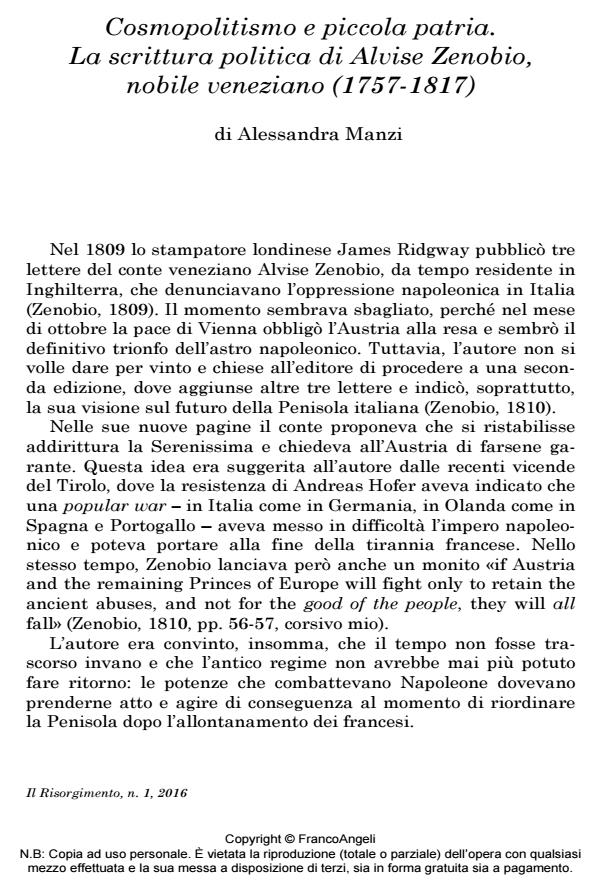Cosmopolitanism and small homeland. The political writings of Alvise Zenobio, Venetian Aristocrat (1757- 1817).
Journal title RISORGIMENTO (IL)
Author/s Alessandra Manzi
Publishing Year 2016 Issue 2016/1
Language Italian Pages 29 P. 117-145 File size 210 KB
DOI 10.3280/RISO2016-001005
DOI is like a bar code for intellectual property: to have more infomation
click here
Below, you can see the article first page
If you want to buy this article in PDF format, you can do it, following the instructions to buy download credits

FrancoAngeli is member of Publishers International Linking Association, Inc (PILA), a not-for-profit association which run the CrossRef service enabling links to and from online scholarly content.
The essay retraces the adventurous political life of Alvise Zenobio, Venitian aristocrat, who from 1789 to 1816 lived between London and Paris and actively discussed the significance of the revolutionary and Napoleonic years. At first a supporter of the French revolution to the point of translating a pamphlet by Abbe Seyes into English, he later looked at the birth of a democratic republic with some concern, finally becoming an enthusiast of Napoleon’s victories in Italy. In 1797 Alvise Zenobio cheered at the collapse of the Venetian Republic and in 1802 he translated and published a work by Hume, which he hoped would inspire the Constitution of the Italian Republic. Quite soon, though, he became disappointed by Napoleon and when the French Empire crashed he tried to plead the return to independence of the Venetian Republic. The essay analyses Alvise Zenobio’s many political works - often even crediting him with some anonymous ones - and sets light on a political career which exhausts the Enlightenment’s cosmopolitanism in the acceptance of a rediscovered small homeland.
Keywords: Venetian Republic, Enlightenment’s cosmopolitanism, small homeland
- De l’Italie ([1797?]) dans son état actuel et politique, s.l., s.e., a. V.
- Bewley, C. e D. (1998), Gentleman Radical: a Life of John Horne Tooke, 1736-1812, London, Tauris.
- Blakemore S. (1997), Crisis in Representation: Thomas Paine, Mary Wollstonecraft and Helen Maria Williams and the Rewriting of the French Revolution, Cranbury NJ, Associated University Press.
- Breganze G. (anno X [1801-1802]), Rilievo critico del cittadino Breganze al discorso del cittadino Zenobio sul diritto di suffragio, Milano, Mainardi.
- Challamel A. (1895), Les clubs contre-révolutionnaires, cercles, comités, sociétés, salons, réunions, cafés, restaurants et librairies, Paris, Cerf.
- Darmano D. (1872), Inediti documenti sulle vicende di Alvise Zenobio, in “Archivio veneto”, 3, pp. 278-300.
- Derry J. (1989), The Opposition Whig and the French Revolution, in Dickinson H. T. (ed.), Britain and the French Revolution, 1789-1815, London, MacMillan, pp. 39-59.
- Giormani V., Torrens H. S. (2006), Il conte Alvise Zenobio, 1757-1817: un patrizio veneto tra agio e avventura, Venezia, Istituto veneto di scienze, lettere ed arti.
- Goodwin A. (1979), The Friends of Liberty. the English Democratic Movement in the Age of the French Revolution, London, Hutchinson.
- Manogue R. A. (1996), The Plight of James Ridgway, London Bookseller and Publisher, and the Newgate Radicals, 1792-1797, in “Wordsworth Circle”, 27, n. 3, pp. 158-166.
- Melancini R., ([1801-1802]), L’aristocrazia territoriale convinta da Melancini, ex-rappresentante cisalpino, ossia confutazione della repubblica perfetta di Hume e specialmente del successivo discorso di Zenobio in cui sono esclusi dal diritto di suffragio non solo i non possidenti, ma ancora i possidenti inferiori alla rendita di 400 giornate lavorative, Milano, Genio tipografico, anno X.
- Robinson P. (2014), Henry Delahay Symonds and John Ridgway’s Conversion from Whig Pamphleteers to Doyens of the Radical Press, 1788-1793, in “Papers of the Bibliographical Society of America”, 108, n. 1, pp. 61-90, DOI: 10.1086/680834
- Sieyes E. (2003), Political Writings. Including the Debate Between Sieyès and Tom Paine, Edited with an Introduction and Translation of What Is the Third Estate, edited by M. Sonenscher, Indianapolis, Hackett. Wahnich S. (1997), L’impossible citoyen. L’étranger dans le discours de la Révolution française, Paris, Albin Michel
Alessandra Manzi, Cosmopolitismo e piccola patria. La scrittura politica di Alvise Zenobio, nobile veneziano (1757-1817) in "RISORGIMENTO (IL)" 1/2016, pp 117-145, DOI: 10.3280/RISO2016-001005